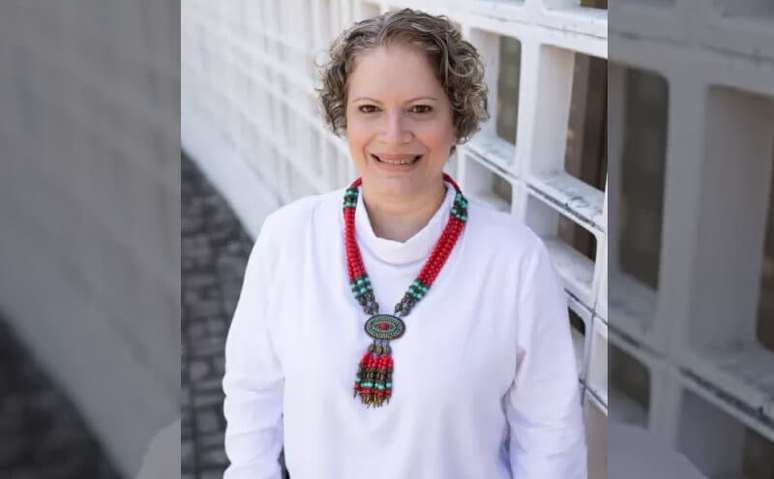He wasn’t afraid to leave federal public office to put his beliefs into practice
html[data-range=”xlarge”] figure image img.img-819ae9e1d836bec8d2324c23489206e1jyjgqif6 { width: 774px; height: 479px; }HTML[data-range=”large”] figure image img.img-819ae9e1d836bec8d2324c23489206e1jyjgqif6 { width: 548px; height: 339px; }HTML[data-range=”small”] image figure img.img-819ae9e1d836bec8d2324c23489206e1jyjgqif6, html[data-range=”medium”] figure image img.img-819ae9e1d836bec8d2324c23489206e1jyjgqif6 { width: 564px; height: 349px; }
Profiling someone is, for me, one of the hardest forms of writing. First, because I have to accept my inability to read that individual as a whole and, recognizing this truth, I have to settle for the cut I am about to present and open myself to the injustices I will invariably commit. The profile exposes the character, but reveals, to a large extent, who writes it. And I am satisfied that by telling the story of Martha Oliveira, founder of Laços Saúde, I will attest to my inability to convey to you the energy that pulsates in this woman.
Martha is restless – and you’ll soon have evidence to back you up. But this trait does not manifest itself in the form of anxiety, as it can be. Her speech, sung with a Carioca accent, has a rhythm in which every word comes out clearly and sentences are formed with correctness, without haste or frenzy.
She speaks, today an entrepreneur, as she spoke when she was director of the National Supplementary Health Agency (Ans) and, in her early thirties, confronted a predominantly male and middle-aged universe. And in the same way, when she was director of the National Association of Private Hospitals (Anahp), she would enter the boardroom in her printed dress and sit at the head of the table to discuss with the men in suits. Her space is conquered naturally, without her seeming to care. After all, there’s a lot of work to be done.
With you, the work to do
Martha’s career in healthcare began with medical school and a pediatrics residency. But the clinic took up little space in her trajectory and she soon became, as her son says, “paper doctor”.
“I went to do a residency in collective health, which has a multidisciplinary approach”, Marta and Silvia Paladino told me in an interview with Valley of Affliction (**), podcast on the background of entrepreneurship.
Friends and family didn’t understand the decision and this would be the first of many times it would happen. “They said, ‘Here. He gave up medicine,'” she says. “This population study thing was already something of mine. Because if I help one by one, I won’t be able to stand by everything I believe and everything I want.” A public competition soon followed to work at the Supplementary National Agency for Health. In less than a year you were invited to move to Brasilia as a parliamentary adviser and chief of staff. She was crying, thinking she couldn’t make it. Today, with a broad smile, she’s grateful for the challenge.
“I had the opportunity to expose myself to situations that made me grow a lot, get to know another world, know things differently”.
The Brazilian supplementary health system is highly regulated and, year after year, the number of beneficiaries is around 50 million people. Agonized, as she describes herself, Martha didn’t expect to make anything less than a revolution when she took over.
“Public policy hinges on things that are sometimes far out of reach. When I sat in the director’s chair, I was like ‘oops, now go!’ When I walked away, I saw that I had done 40% of the things I wanted to do. And I worked hard to get that 40%. There’s a lot of stuff involved there. It’s not in your time. It’s in time it can be. In the national context of everyone’s time”.
And with the global vision he has acquired at the helm of the public body, he has identified bottlenecks that he didn’t even know about. “There’s a world of opportunity there and we’re just paddling here, standing still. No. I want a speedboat.”
And at age 40, she resigned from her position as a federal civil servant. Guess the opinion of the family?
From Anahp to Laços Saúde
Martha’s boat docked for four years at Anahp, the most prestigious association of private hospitals in Brazil, before moving into entrepreneurship. The idea was to anchor, as soon as the winds were favourable, at a specific destination.
“When I was at ANS, while I was trying to organize the sector so that it could be better, I saw big gaps that weren’t filled. And one of them was ageing”. A lot of study of international references and a doctorate in population aging formed the basis of what is today Laços Saúde, created in 2020, after a new (inexplicable for some) resignation.
It was time to start over, hitting a lion that everyone wanted to put to sleep with a short stick. “We have brought the Dutch Burtzog method to Brazil. It is a very different method of accompanying and caring for the elderly, which comes to generate autonomy and reduce costs. It is based on monitoring, coordination of care, assistance and home visits – all with the help of technology,” he says. The proposal is to dissociate aging from disease, a conviction now rooted above all in Western societies.
“Today we see aging as a defeat. Aging is a conquest. We have conquered aging, we have conquered life expectancy. We must understand that it is a natural path and think about how to age in the best possible way”, he says Martha Oliveira.
The uncomfortable discussion of aging invariably triggers other uncomfortable discussions of limitation, medical practice, public policy, and social and family culture. But Martha isn’t afraid to disrupt. “Terminality is an issue that comes up and needs to come up. Happy death, palliative care at the end of life…we are totally unprepared for that. Doesn’t a 97-year-old man having a heart attack need to be intubated? his will?” With medical juniors shouting “no one dies on my shift,” life is stretched with no maturity to accept the end. “We were dying of acute illness, diarrhoea, childbirth. It was another story. Then it’s okay to shout ‘no one dies on my shift’. But now it’s another story.”
This other story is the unstoppable REALIZATION (in bold, to show I’ve learned) of population aging. By 2050, the world will have two billion elderly people. Do the math: in 27 years, how old will you be? In the conversation with Martha, Sil reminded us that this elderly population of the future, about whom we talk so much without obligation, is us (if, of course, you are at least 35 years old). And there? What kind of health, society and end of life do we want to build for our old age? “Aging brings up these issues. Like it or not, we have to discuss it,” warns Martha, as if we were talking about the weekend schedule.
is a journalist specializing in IT, business and health with nearly 20 years of experience. After passing through the editorial offices of vehicles such as Estadão, Infomoney, ITWeb and CRN Brasil, he co-founded the agencies Essense and Lightkeeper, which have already helped more than 80 companies in building cross-platform narrative content for businesses. He co-host of the podcast Vale do Suplício. (**) Created by journalists Adriele Marchesini eSilvia Noara Paladin
, the Vale do Suplício podcast was born as a counterculture to stage entrepreneurs – the typical MEI CEOs, LinkedIn text writers – to tell the story of entrepreneurs who say little, but do a lot. Listen on Spotify.
Source: Terra
Ben Stock is a lifestyle journalist and author at Gossipify. He writes about topics such as health, wellness, travel, food and home decor. He provides practical advice and inspiration to improve well-being, keeps readers up to date with latest lifestyle news and trends, known for his engaging writing style, in-depth analysis and unique perspectives.








